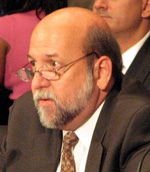Members of a House Agriculture subcommittee are expressing concerns that restrictions under the Renewable Fuels Standard (RFS) in the 2007 Energy Independence and Security Act could be detrimental to the development of second generation ethanol using biomass.
The House Agriculture Subcommittee on Conservation, Credit, Energy, and Research held a hearing to review the RFS implementation and agriculture producer eligibility. Chairman Congressman Tim Holden (D-PA) said restrictions in the definition of “renewable biomass” under the RFS limit the participation of private forestland owners.
“As our economy diversifies its energy supply, it is critical we take advantage of all potential sources of renewable biomass,” Holden said. “Unfortunately, the RFS contains some restrictions that could delay and threaten meeting the aggressive targets for cellulosic ethanol in the RFS and hold us back from achieving energy independence.”
 Environmental Protection Agency Deputy Assistant Administrator Robert Meyer noted that the new law does “limit the crops and crop residues used to produce renewable fuel to those grown on land cleared or cultivated at any time prior to enactment of EISA, that is either actively managed or fallow, and non-forested. EISA also requires that forest-related slash and tree thinnings used for renewable fuel production pursuant to the Act be harvested from non-federal forest lands.” This was just one of the many complexities he outlined in the challenge EPA has in implementing the RFS in a timely manner.
Environmental Protection Agency Deputy Assistant Administrator Robert Meyer noted that the new law does “limit the crops and crop residues used to produce renewable fuel to those grown on land cleared or cultivated at any time prior to enactment of EISA, that is either actively managed or fallow, and non-forested. EISA also requires that forest-related slash and tree thinnings used for renewable fuel production pursuant to the Act be harvested from non-federal forest lands.” This was just one of the many complexities he outlined in the challenge EPA has in implementing the RFS in a timely manner.
Meyers said EPA began working on implementation of the law immediately once it was signed by the president in December, but he was hesitant to be definite about when that might finally be accomplished, saying only that they hope the final rule to be finished “some time this fall.” Complicating the matter still further is the request for a partial waiver of the RFS submitted by Texas Governor Rick Perry, which EPA has delayed making a decision on due to the volume of comments received.


 As we reported back on
As we reported back on  Researchers at Mississippi State University are looking at ways to turn the millions of pounds of shrimp parts not used for food into biodiesel.
Researchers at Mississippi State University are looking at ways to turn the millions of pounds of shrimp parts not used for food into biodiesel.

 The
The  Farm Foundation president Neil Conklin says what the study shows is that today’s food price levels are the result of complex interactions among multiple factors, including global changes in production and consumption of key commodities, the depreciation of the U.S. dollar, and growth in the production of biofuels.
Farm Foundation president Neil Conklin says what the study shows is that today’s food price levels are the result of complex interactions among multiple factors, including global changes in production and consumption of key commodities, the depreciation of the U.S. dollar, and growth in the production of biofuels. A new feedstock for the growing biodiesel industry could be a cash cow for the western states where it will be growing.
A new feedstock for the growing biodiesel industry could be a cash cow for the western states where it will be growing. While the EPA delay of issuing a decision on Texas’ request for a waiver from the Renewable Fuel Standard (see
While the EPA delay of issuing a decision on Texas’ request for a waiver from the Renewable Fuel Standard (see  “In considering the Renewable Fuels Standard (RFS) waiver request by Gov. Perry, it is important to note that all renewable fuels qualify for the current RFS. In fact, if the RFS is waived or cut in half in 2008, then the growth of all biofuels, including ‘advanced biofuels’ such as biodiesel, will be severely hindered.
“In considering the Renewable Fuels Standard (RFS) waiver request by Gov. Perry, it is important to note that all renewable fuels qualify for the current RFS. In fact, if the RFS is waived or cut in half in 2008, then the growth of all biofuels, including ‘advanced biofuels’ such as biodiesel, will be severely hindered.